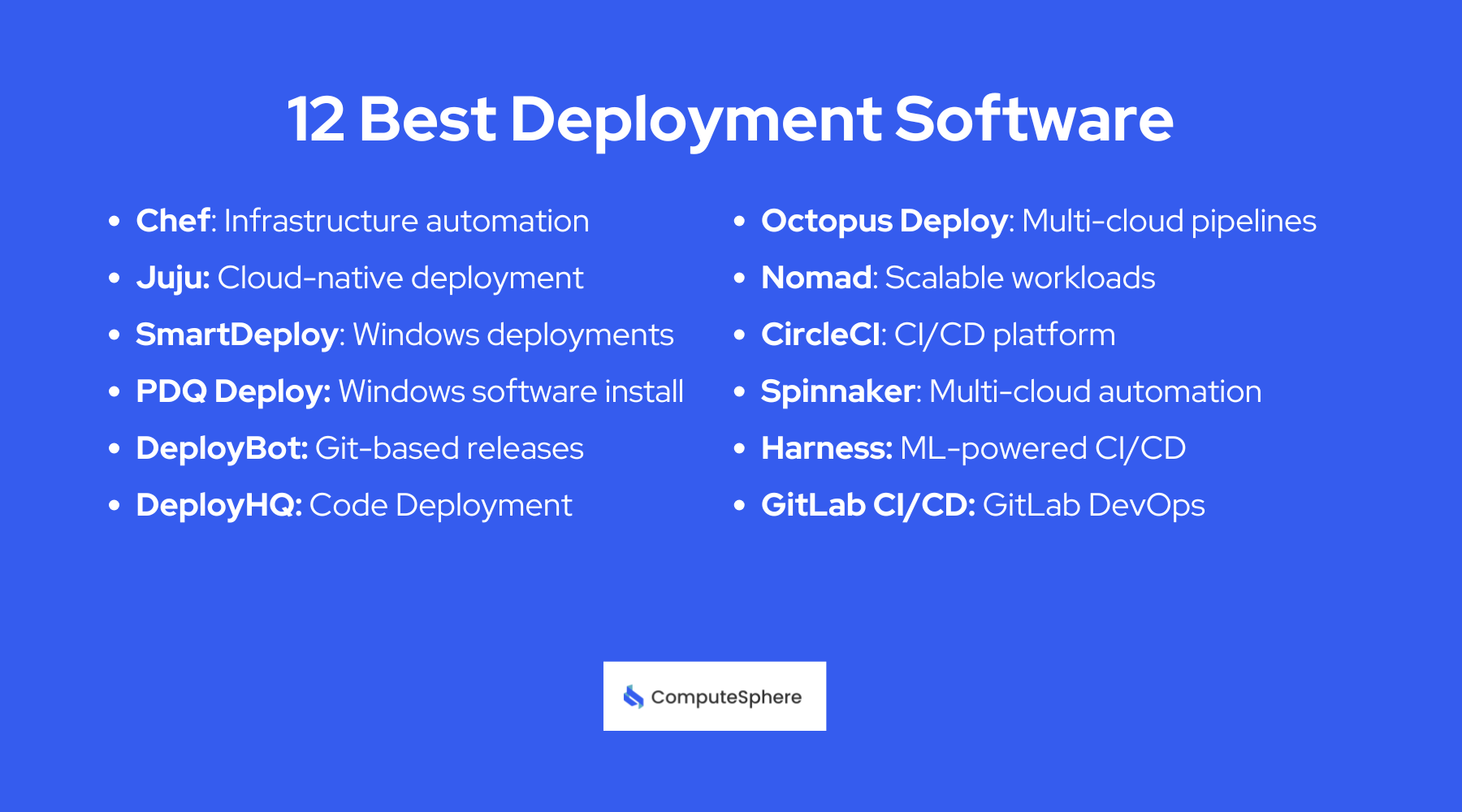The Ultimate List: 12 Best Deployment Software

Deployment tools are essential for modern development. It helps IT professionals, developers, and operations teams manage efficient and reliable software releases. By automating complex processes, deployment tools reduce the risk of errors, save time, and support continuous integration and delivery (CI/CD) practices.
These tools ensure smooth transitions between environments, keep code in sync, and provide valuable insights into system performance and issues. So, for teams aiming for agile workflows, deployment tools are the backbone of streamlined collaboration and faster updates.
Here’s a look at the leading deployment software to consider for smooth and effective application delivery.
What is Deployment Software?
Deployment software streamlines the process of delivering applications from development to production. It ensures reliable and efficient releases. It automates tasks like code packaging, environment configuration, and version control, reducing manual errors and enhancing speed. With advanced options for continuous integration and delivery (CI/CD), deployment software supports consistent updates across various environments. It’s essential for teams aiming for agile and DevOps practices. It also improves collaboration and deployment frequency.
12 Best Deployment Software

1. Chef
Chefis an open-source configuration management tool designed to streamline infrastructure automation. It allows teams to define infrastructure as code, making it easier to manage complex deployments across servers and cloud environments.
Pros:
- It has flexible and powerful configuration management capabilities.
- Strong community support and extensive documentation.
- It supports multi-cloud environments and integrates well with cloud providers.
- It enables continuous integration and deployment (CI/CD) for infrastructure.
Cons:
- It is a steep learning curve for beginners.
- It has high resource usage can lead to increased infrastructure costs.
- Complex for smaller projects with minimal automation needs.
2. Juju
by Canonical is a deployment and orchestration tool aimed at making it easier to scale and manage cloud environments. Juju uses "charms" to automate the deployment and management of services, making it ideal for cloud-native applications.
Pros:
- It can be easy to set up with ready-made “charms” for common applications.
- It is ideal for scaling applications in multi-cloud and hybrid environments.
- Supports various cloud providers and on-premises solutions.
- It simplifies the management of microservices architectures.
Cons:
- It has limited support for non-cloud environments.
- Smaller community, leading to less third-party documentation.
- It can be restrictive when handling highly customized setups.
3. SmartDeploy
SmartDeploy is a powerful deployment software focused on simplifying IT management and deployment. It supports a wide range of operating systems and applications. It provides a user-friendly interface for managing deployments.
Pros:
- Streamlines OS and application deployment, making it ideal for IT departments.
- Pre-built images for faster deployment.
- Excellent customer support and training resources.
- It also allows remote deployment across various environments.
Cons:
- Limited support for non-Windows environments.
- Pricing can be high for small businesses.
- It is less suited for complex, multi-service cloud applications.
4. PDQ Deploy
PDQ Deploy is a software deployment tool customized for Windows systems. It automates software installation and patch management, making it a popular choice for IT departments in managing workstations.
Pros:
- It is a user-friendly interface with intuitive controls.
- Strong for managing Windows systems and applications.
- Excellent for remote software deployment.
- It integrates with the PDQ Inventory for comprehensive system management.
Cons:
- It has limited to Windows-based deployments.
- Not ideal for web or cloud-based applications.
- Limited scalability for larger enterprise-level deployments.
5. DeployBot
is a deployment tool that automates the release of applications to servers and cloud environments. It offers integration with popular Git repositories, making it a popular choice for CI/CD pipelines.
Pros:
- Simple to set up and use with Git integration.
- Supports rollback functionality for safer deployments.
- Offers integration with various cloud providers.
- Facilitates easy debugging of code changes.
Cons:
- Limited to code-based deployments.
- Additional cost for advanced features.
- No support for non-cloud applications or systems.
6. DeployHQ
DeployHQ is a deployment tool focused on simplicity, designed to automate the deployment of code from Git, Mercurial, and other version control systems to your servers. It supports a variety of environments, making it versatile.
Pros:
- Supports a wide range of version control systems.
- Offers rollback and real-time logging for better debugging.
- Customizable deployment pipelines.
- Strong integration with popular cloud platforms.
Cons:
- Limited functionality for highly complex applications.
- Not suitable for non-code deployments.
- High costs for advanced plans.
7. Octopus Deploy
Octopus Deploy is a powerful deployment automation tool that enables teams to manage releases in various environments. It’s ideal for complex applications and supports multi-cloud and hybrid infrastructure.
Pros:
- Robust support for complex deployments and multi-cloud environments.
- Easy integration with CI tools like Jenkins and Azure DevOps.
- Comprehensive API and web-based UI for deployment management.
- Customizable pipelines and excellent rollback options.
Cons:
- Expensive for small teams.
- Requires advanced knowledge for optimal use.
- Can be overkill for simple deployments.
8. Nomad by HashiCorp
Nomad is a flexible deployment and workload orchestration tool that works across on-premises, cloud, and hybrid environments. It’s particularly suitable for applications that require high scalability.
Pros:
- Supports both Docker and non-containerized workloads.
- Scalable across multiple cloud providers and environments.
- Simple, single-binary deployment.
- Integrates well with other HashiCorp tools like Consul and Vault.
Cons:
- Steeper learning curve compared to simpler tools.
- Limited community support outside of HashiCorp’s ecosystem.
- Less suitable for non-developer IT environments.
9. CircleCI
is a CI/CD platform that automates the testing and deployment process. It supports a variety of programming languages and deployment configurations, making it popular among developers.
Pros:
- Excellent integration with GitHub, Bitbucket, and GitLab.
- Extensive support for Docker and Kubernetes.
- Scalable with parallel job execution.
- Comprehensive insights and analytics.
Cons:
- Higher pricing for additional resources.
- Complex setup for custom pipelines.
- Limited support for non-code deployments.
10. Spinnaker
Spinnaker is an open-source continuous delivery platform created by Netflix. It allows teams to deploy applications in multi-cloud environments with robust automation and monitoring tools.
Pros:
- Strong multi-cloud support, ideal for hybrid environments.
- Integrates well with Jenkins, Prometheus, and Grafana.
- Flexible pipelines with powerful customization.
- Comprehensive monitoring and rollback capabilities.
Cons:
- Complex setup with a steep learning curve.
- Limited community resources and documentation.
- Overhead costs for smaller teams or simple projects.
11. Harness
Harnessis a Continuous Delivery (CD) and Continuous Integration (CI) tool that uses machine learning to automate the deployment process. It’s especially useful for reducing deployment risk and optimizing CI/CD pipelines.
Pros:
- Machine learning to optimize deployment success.
- Strong security features with role-based access controls.
- Excellent integration with Git and cloud providers.
- User-friendly interface for managing pipelines.
Cons:
- Higher cost due to advanced features.
- Limited flexibility in some customization areas.
- Requires advanced expertise for effective usage.
12. GitLab CI/CD
GitLab CI/CD is an integrated tool within GitLab that enables continuous integration and delivery. It’s ideal for teams using GitLab for version control and offers an end-to-end DevOps solution.
Pros:
- Integrated seamlessly with GitLab repositories.
- Excellent for CI/CD pipelines with strong community support.
- Supports Docker and Kubernetes deployments.
- Open-source version available.
Cons:
- Limited functionality outside GitLab’s ecosystem.
- Advanced features require a paid subscription.
- Less customizable than standalone CI/CD tools.
Key Features
- Automated Deployment and Rollback: Automates deployment processes, reducing manual errors and enabling quick rollbacks if issues arise, ensuring reliability and faster release cycles.
- Version Control Integration: Integrates seamlessly with Git, Bitbucket, or GitLab, allowing deployments directly from repositories and keeping a record of code changes for easy tracking.
- Multi-Environment Support: Provides support for deploying across development, staging, and production environments, essential for testing and validating updates before live release.
- Real-Time Monitoring and Alerts: Offers real-time monitoring with alerting for any errors or performance issues during deployment, allowing rapid response and ensuring smooth operations.
- Scalability for Complex Infrastructures: Scales deployments across multiple servers, containers, or cloud environments, suitable for handling high-traffic and distributed applications.
- Customizable CI/CD Pipelines: Allows for automated CI/CD workflows with customizable pipelines, streamlining the build, test, and deployment phases for continuous delivery.
- Security and Access Control: Implements role-based permissions, ensuring only authorized users can deploy or access specific configurations, enhancing security and compliance.
Conclusion
Selecting the right deployment software can make a big difference in your team’s efficiency and project success. These tools simplify complex tasks by automating workflows, connecting with CI/CD systems, and providing real-time insights.
Typically, IT professionals, developers, and operations teams can work together more smoothly and avoid common deployment errors by using software.
As technology continues to grow, keeping your deployment tools up-to-date will help you stay ahead. So, take the next step and explore these options to make your deployment process faster and easier!
Contents
Built for Builders. Priced for Startups.
Tired of unpredictable cloud bills? ComputeSphere offers modular, fixed-cost cloud hosting that grows with your startup—no DevOps headaches, no surprises.
Get StartedShare this article
Browse Some Related Blogs
Relevant and related contents you can read








